
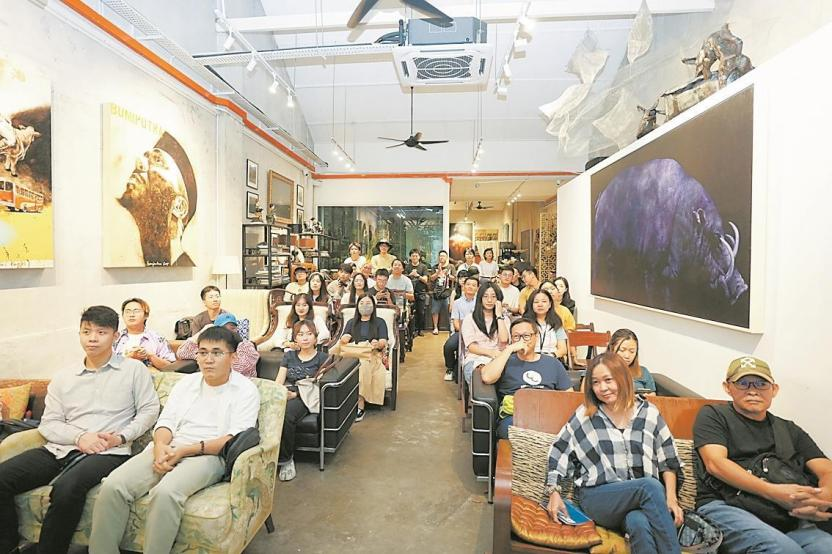
On November 2nd at 8 p.m., the final screening of the Maritime Guangdong Program Film Festival took place at Jalan Panggung, Kuala Lumpur. As the lights dimmed, the flickering images on the screen illuminated the youthful faces of Malaysian filmmakers, young Malaysian Chinese, Chinese students studying abroad, and the Chinese directors of the screening short films supported by the 2023 Maritime Guangdong Young Director Support Program (Maritime Guangdong Program).
Despite a sudden downpour in Kuala Lumpur before the start of the screening, the enthusiastic audience did not disappoint and instead filled the screening venue in advance. "Thank you all for braving the rain to watch our films," said Charlotte Chen on behalf of the directors as she expressed her gratitude to the audience. "These three days of the film festival have been incredibly rewarding. We have also made many new friends from Malaysia, and this process has been as precious as the screening itself." The Malaysian audience inside The venue expressed Their gratitude and farewell to the young Chinese directors who brought Them wonderful works with unending applause.
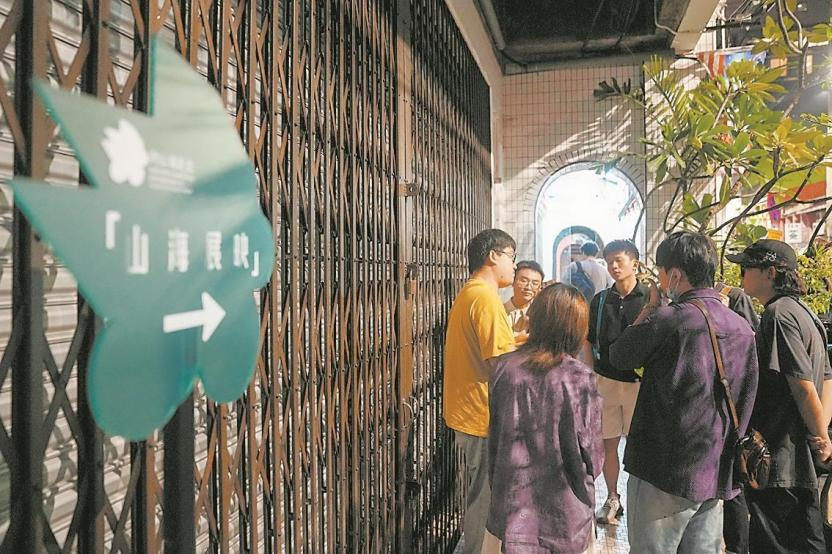
Tell me, what is the name of this nursery rhyme?
The four films screened that day were "The Returning Island", "How Can I Rid My Mind of Her", "Fantasy Blues of 'Gua Ling'", and "The River That Holds My Hand", each with its unique style that provides a satisfying experience for the attending audience.
Renowned Malaysian screenwriter Chan Yoke Yeng was curious about a nursery rhyme that appeared in both "The Returning Island" and "The River That Holds My Hand" after watching all The films. Director Canjie Zhuang of "The Returning Island" revealed that it is called "Give you hugs". He said that almost every child in the Chaoshan region has heard their moThers sing it during their childhood. The young director deliberately modified the lyrics when incorporating this nursery rhyme into the film. Originally, the song sang about mothers' hopes for Their children to succeed away from home. However, Zhuang realized that every moTher only wishes for Their wandering child to return home safely as soon as possible.
In the short film "The Returning Island", Canjie Zhuang employs a fantastical approach to narrate a touching story of tracing roots across the Taiwan Strait. Many audience members expressed their love for this work, which combines fantasy with animation. When asked about the possibility of a sequel by the audience, Zhuang responded, "My 'folklore fantasy trilogy' is currently in progress!" He revealed that, in addition to "The Returning Island", which draws inspiration from Mazu culture, he is preparing two more short films titled "Time Has Spoken" and "Our Yingge". The former tells the story of a pair of bickering lovers transcending time and space, while the latter narrates the tale of two brothers in Taiwan and the Chinese mainland through the medium of Yingge Dance.
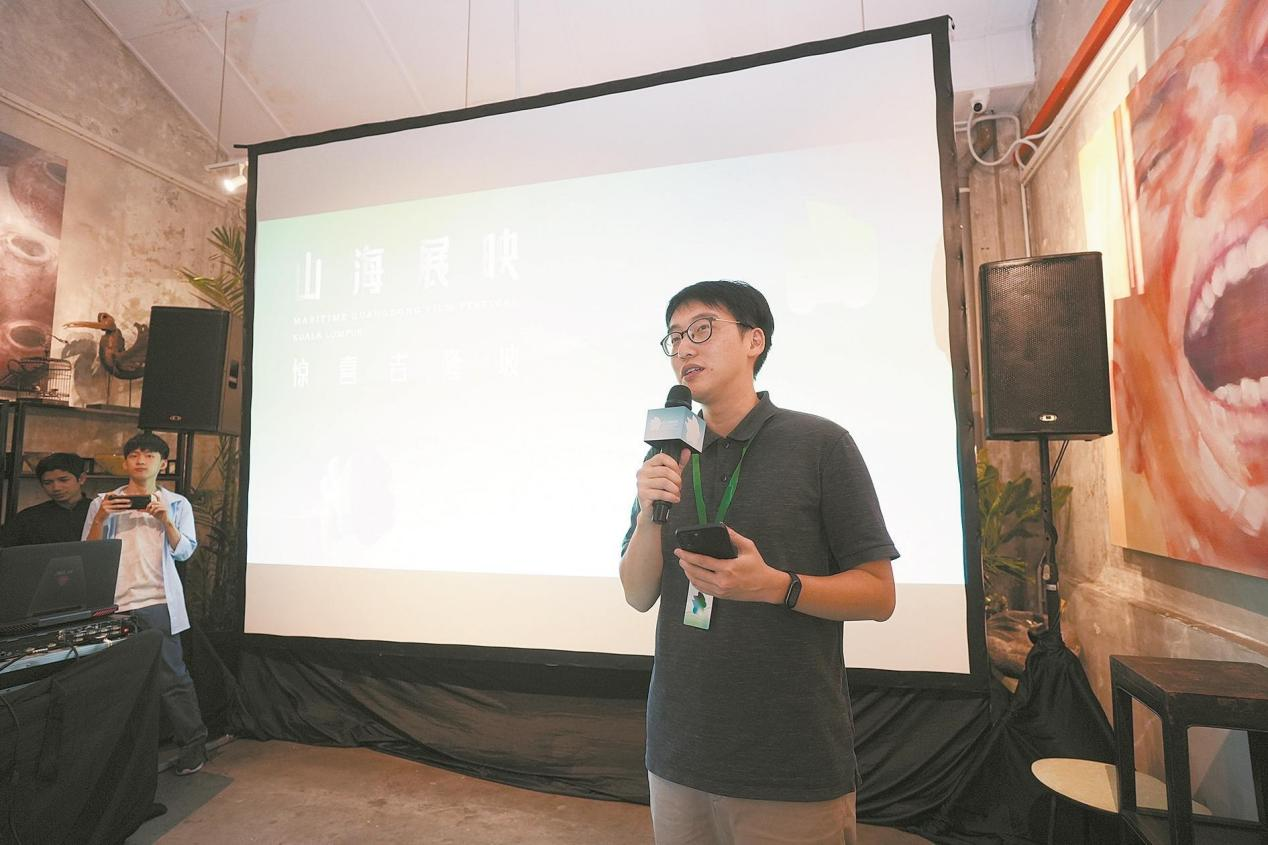
The depth of These works surprises viewers
Hancheng Shen, the director of the film media“directube” expressed his amazement during the post-screening discussions, saying, "I have seen many short films by young directors, but in comparison, the series of Maritime Guangdong Program stands out with its depth of history. Some of the works even trace back several decades in history, surpassing the individual experiences of the creators. This profound expression has brought me great surprise." He encouraged young directors like Wenli Huang to continue striving in this direction, "Hou Hsiao-hsien's 'A City of Sadness' and Jia Zhangke's 'Platform' are typical examples of directors expressing profound ideas in their early works."
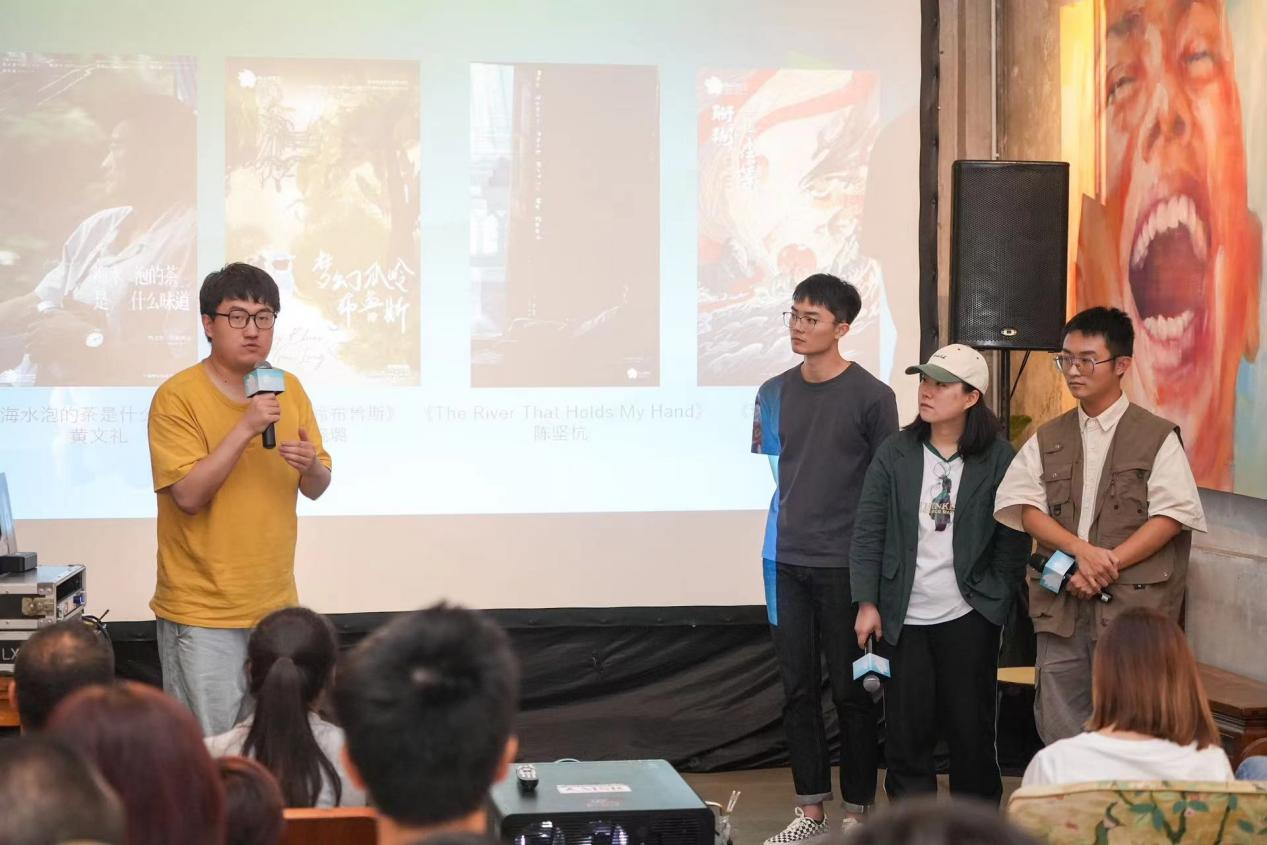
Director Wenli Huang, the director of "How Can I Rid My Mind of Her", shared his motivations for delving into a subject matter far removed from his own experiences. Being not hailing from an immigrant background himself, nor having any personal encounters of venturing "leaving for Southeast Asia", Huang found a unique entry point in the concept of "suffering overseas Chinese". This term refers to those Chinese compatriots who have faced war, natural disasters, or persecution abroad. In his film, the protagonist Kin, a returnee from Vietnam, embodies the struggles and pain of being a "suffering overseas Chinese". The movie vividly reimagines the renowned Yinghong Overseas Chinese Tea Farm, where this poor man, having lost his loved one, wrestles with the traumas of life.
During The event, The screenwriter Chan Yoke Yeng also expressed her admiration for "How Can I Rid My Mind of Her". She pointed out, "One distinctive aspect of this short film is its blank-leaving, which prompts contemplation from the very title itself."
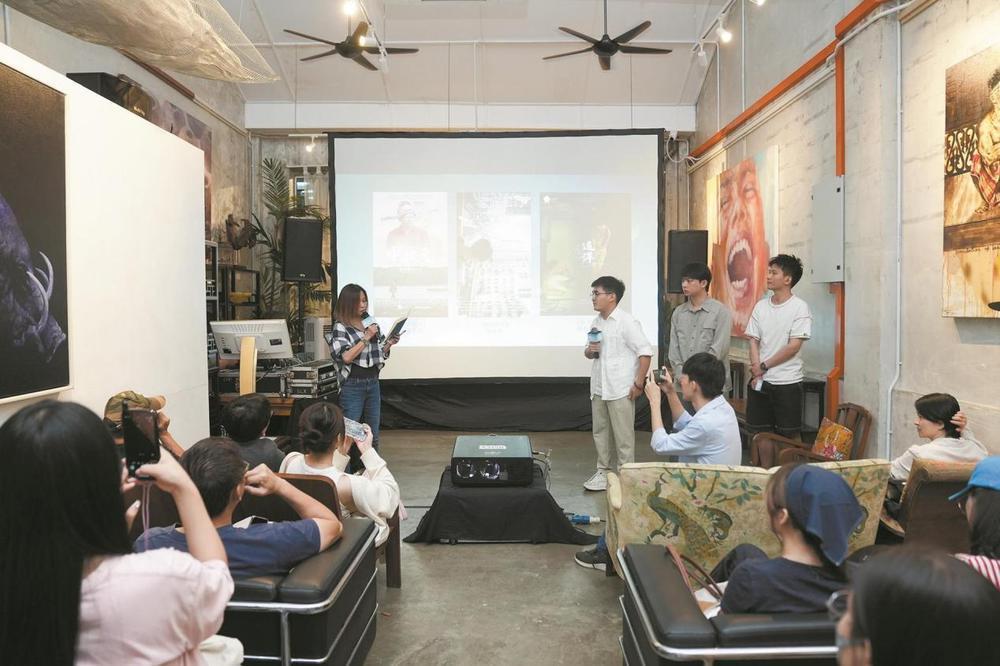
Multifaceted expressions provoke diverse emotions
Director Charlotte Chen's "Fantasy Blues of 'Gua Ling' " also delighted the screenwriter Chan Yoke Yeng. In her comments, "It approaches the past from a childlike perspective, free from the weight of history. It is a sincere work that handles complicated matters with ease." The short film was shot in Gualing, an ancient village in Zengcheng, Guangzhou. From the perspective of two young individuals who accidentally stumble into a surreal world, the film transforms the authentic Lingnan village into a captivating realm.
"I'm not from Guangdong, nor are my parents, and I only started living here as an adult. So, I've always held a strong curiosity about this land," revealed director Charlotte Chen during her interaction with The audience. She further shared, "Gualing is not a large ancient village, but it holds many treasures. I approached it with a sense of treasure hunting, bringing a touch of unreality to the film and telling the story through light and whimsical cinematography." With a smile, she added, "I feel like other directors' works are like 'main dishes' while I'm creating a 'dessert.' During The screening, I heard laughter from the audience in response to the scenes I designed, which made me quite happy!"
Chan Yoke Yeng believes that it is precisely the different styles that infuse the creative endeavors of young filmmakers with vitality and possibilities. In the previous day's screening, she spoke highly of So Chak Long's "Migratory Bird", Adam Yang's "My BroTher", and Jiacao Chen's "The Puppetmaster", expressing how each work evoked unique touches. WheTher it was The impact of the Leizhou opera in "The Puppetmaster", the resonance triggered by "My Brother" as it explored issues of identity or the familiar Hong Kong-style expressions portrayed in "Migratory Bird", they all left a lasting impression.
Furthermore, the first day's screenings of short films such as Paco Wen's "Reunited", Holmes Deng's "Swimming Lesson," and Huizhi Deng and Yuan Zhang's "Being Him Back", all of which brought numerous surprises to The audience.
2023“山海展映”吉隆坡圆满收官 山海短片有着超越个体的历史厚重感
11月2日20时,吉隆坡茨厂街,2023“山海展映”开始了在马来西亚的最后一场放映。灯光转暗,银幕的光影闪烁在一张张年轻的脸庞上。他们是马来西亚的电影人、青年华人、中国留学生,以及当晚放映短片的创作者——2023“向山海走去”青年导演创作扶持计划的中国导演们。
这晚“山海展映”开始前,吉隆坡突降暴雨,但热情的观众并未爽约,提前将放映场地坐得满满当当。“谢谢大家冒雨来看我们的电影。”放映结束后,“山海计划”导演陈晓璐代表创作者们向台下观众致谢,“这三天的‘山海展映’让我们收获颇丰。我们还认识了很多马来西亚的新朋友,这个过程跟放映本身一样珍贵。”场内的马来西亚观众则用长久不息的掌声,向这次带来精彩作品的中国青年导演们表达感谢和惜别。
告诉我,这首童谣叫什么?
《珊瑚她在等》《海水泡的茶是什么味道》《梦幻瓜岭布鲁斯》《The River That Holds My Hand》,当天放映的四部作品风格各异,让到场观众一口气看了个过瘾。
马来西亚著名编剧陈钰莹在看完所有影片后,好奇发问:“在《珊瑚她在等》《The River That Holds My Hand》中都出现了的那首童谣是什么?”《珊瑚她在等》导演庄灿杰笑着回答:“这首潮汕童谣叫《拥啊拥》 ,我们潮汕地区几乎每个孩子都在小时候听妈妈唱过。我也是今天才发现,原来陈坚杭在《The River That Holds My Hand》里也用了它。”他透露,他在采用《拥啊拥》时刻意改了歌词,“原本歌里唱的是妈妈希望孩子在外出人头地,但我后来发现,其实每个母亲对外出的游子只有一个真正的心愿,那就是早日平安归来”。
在短片《珊瑚她在等》中,庄灿杰用奇幻的手法,讲述了一个动人的跨越海峡两岸的寻根故事。当天有不少观众对这部结合了奇幻和动画的作品表达了喜爱。对于观众“何时再拍续集”的追问,庄灿杰回答:“我的‘民俗奇幻三部曲’正在创作中!”他透露,除了取材自妈祖文化的《珊瑚她在等》,他正在筹备的另两部短片名为《时间都说过》和《我们的英歌》——前者讲述一对欢喜冤家穿越时空的缘分,后者则通过英歌这一载体,讲述身在台湾和大陆的一对兄弟的故事。
这些作品的厚重感令人惊喜
知名电影资讯公众号“导筒”的主理人沈韩成,这晚也来到“山海展映”现场。他在映后交流时感慨:“我看过很多青年导演的短片作品,相比之下,‘山海计划’系列作品的历史感远远胜出。有些作品甚至对历史有长达数十年的溯源,这种远超创作者个体经验的厚重表达带给我很大的惊喜。”他鼓励黄文礼等“山海计划”青年导演继续朝这个方向努力,“侯孝贤的《悲情城市》,贾樟柯的《站台》,都是导演们在创作早期进行厚重表达的范本。”
《海水泡的茶是什么味道》导演黄文礼表示,他非出生侨乡,家中人也没有过“下南洋”的经历,“但我对这个题材很有兴趣,最终我找到了难侨这个独特的切入点。”难侨指的是在国外遭受战争、天然灾害或人为迫害的侨胞,黄文礼作品《海水泡的茶是什么味道》中的男主人公阿建便是一名越南归来的难侨。影片再现了著名的英红华侨农场,片中失去爱人的阿建在静谧的农场中,与人生伤痛挣扎缠斗。
编剧陈钰莹在发言时也表达了对《海水泡的茶是什么味道》的喜爱。她指出:“这部短片的一大特点是留白感,它甚至从片名开始就能带给观众思考。”
多元表达,带来不同的触动
陈晓璐执导的《梦幻瓜岭布鲁斯》也让编剧陈钰莹感到欣喜:“它用小朋友一般的视角去看待以前的时代,没有历史负重感,是一部举重若轻的真诚之作。”这部短片取景拍摄于广州增城瓜岭古村,从两个“误闯仙境”的年轻人的视角,将颇具实感的岭南古村拍摄出了迷人的超现实效果。
“我爸妈都不是广东人,我自己也是成年后才来广东生活,所以我对那片土地一直带着很强烈的好奇心。”陈晓璐在跟观众交流时透露,“瓜岭古村不大,但有很多宝藏,我对它的感觉像探宝一样,所以我也把某种不真实感带到了电影里,用一种轻盈和跳脱的镜头语言来讲故事。”她笑着说:“我觉得其他导演的作品就像‘大菜’,而我做的是一道‘甜品’。刚才放映时,我听到身边有观众因我设计的桥段笑出了声,这就让我挺开心的!”
陈钰莹认为,正是不同的风格让年轻人的创作充满活力和可能性。在前一日的“山海展映”中,她对苏泽朗的《家庭旅行》、杨哲霖的《远洋》、陈家操的《中状元》同样赞不绝口,称在这三部作品中感受到了不同的触动,如《中状元》中雷剧带来的震撼感、《远洋》对身份认同问题的探讨所引发的共鸣,以及《家庭旅行》中让她感到亲切的港式表达。
此外,“山海展映”首日放映作品——温柏高的《锦鲤,锦鲤》、邓亮宏的《游泳课》、邓惠芝和张元的《马仔梦露》,也都给观众带来了诸多惊喜。
文 | 记者 李丽
译 | 陈萱
摄影 | 蔡嘉鸿
-
Maritime Guangdong Program Film Festival rounds off successfully in Kuala Lumpur with short films featuring the depth of history
2023-11-05 23:12:27 -
Guangzhou: "Elderly School" helps seniors bridge the digital divide
2023-11-05 23:12:34 -
Maritime Guangdong Program Film Festival in Kuala Lumpur successfully rounds off: showing blood ties and spiritual connection
2023-11-05 23:12:44 -
Photos|134th Canton Fair concludes with an export volume of $22.3b
2023-11-05 23:12:53






